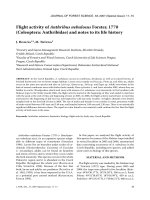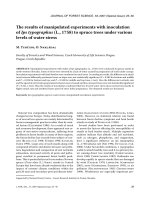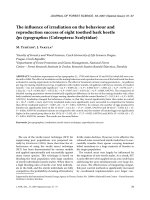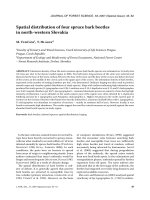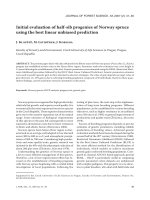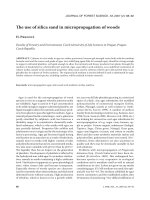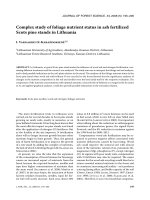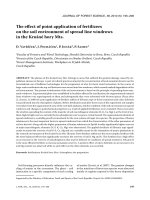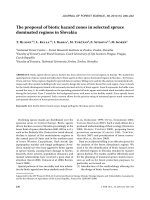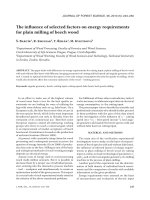Báo cáo lâm nghiệp: "Correlative control of early stages of flower bud initiation in ’bourse’ shoots of apple (Malus x domestica Borkh. cv. Golden Deliciou" docx
Bạn đang xem bản rút gọn của tài liệu. Xem và tải ngay bản đầy đủ của tài liệu tại đây (145.91 KB, 3 trang )
Correlative
control
of
early
stages
of
flower
bud
initiation
in
’bourse’
shoots
of
apple
(Malus
x
domestica
Borkh.
cv.
Golden
Delicious)
J. Escobedo
J.
Crabbé
Morphog6n6se
v6g6tale
appliqu6e,
Facult6
des
Sciences
agronomiques,
Gembloux,
Belgique
Introduction
A
better
understanding
of
flowering
in
fruit
trees
would
be
obtained
if
we
could
pre-
dict
where and
when
a
flower
is
to
appear.
This
is
particularly
true
in
those
locations
where
flowering
occurs
for
the
first
time:
they
can
be
predicted
(Crabbe,
1984)
with
a
satisfying
probability
for
fruit
growers’
purposes,
but
any
precise
physiological
or
biochemical
approach
requires
more
than
mere
probability.
Consequently,
although
the
start
of
floral
initiation
is
rather
accu-
rately
known
in
fruit
species,
sound
information
about
floral
induction
and
evocation
is
still
lacking.
As
a
preliminary
to
this
necessary
pre-
diction
problem,
we
began
experimenting
on
apple
’bourse’
shoots.
The
bourse
is
the
swollen
basal
part
of
an
inflorescence
axis
at
the
onset
of
fruit
development;
it
bears
leaves
whose
axillary
buds
differen-
tiate
and
may
grow
out
as
shoots.
The
bourse
shoot
can
flower
again
in
the
following
years
and
so,
by
repeated
flowering,
a
cluster
of
stacked
similar
structures
appears
on
old
trees.
Once
formed,
a
bourse
is
thus
a
known
site
for
renewed
floral
induction.
There
may
be
year-to-year
irregularities
due
to
competi-
tion
with
fruit
growing
at
the
same
site
(alternate
bearing)
or
with
nearby
vegeta-
tive
growth.
Our
objectives
were
to
determine
what
treatments
could
cause
90-100%
of
bourse
buds
to
shift
from
the
vegetative
to
the
floral
state
and
to
define
precocious
signs
of
this
change
in
meristematic
ac-
tivity.
Materials
and
Methods
Six
yr
old
apple
trees,
cv.
Golden
delicious,
were
used
throughout.
Bourses
formed
in
the
current
year,
on
which
young
fruits
were
deve-
loping,
were
labeled
in
early spring.
Later,
some
bourses
with
short
arrested
shoots
(i.e.,
spurs)
and
others
with
long
shoots
(ca
20-30
cm)
were
further
selected
and
treated
separately.
Treatments,
generally
known
to
increase
flower
formation,
though
imperfectly
interpreted
on
physiological
grounds,
were:
branch
ringing,
young
fruit
removal
from
the
treated
bourse
and,
on
the
long
bourse
shoots,
summer
prun-
ing.
These
treatments
were
applied
alone
or
in
combination,
at
different
dates
from
mid-May
to
September.
were
sampled
fortnightly
on
treated
and
control
branches
for
dissection
and
primordia
counting,
until
the
plastochron
decrease
appeared
as
the
earliest
sign
of
floral
initiation
(Fulford,
1966a,
b,
c;
Abbott,
1977).
Terminal
buds
of
spurs
and
terminal
and
lateral
buds
on
long
shoots,
intact
or
pruned,
were
considered
separately.
Results
The
terminal
buds
of
spurs
began
to
form
in
early
May.
So
all
treatments
from
mid-
May
to
early
July
appeared
to
increase
node
formation
within
the
bud.
Neverthe-
less,
branch
ringing
and
fruit
suppression
needed
to
be
combined
to
obtain
over
90%
flowering
(Fig.
1,
bottom).
The
most
precocious
treatments
seemed
the
most
active
in
terms
of
percentage
of
flowering,
although
those
applied
from
mid-June
to
early
July
yielded
the
fastest
response
in
node
number
increase
(Fig.
1,
top).
On
the
average,
a
bud
which
reached
over
18 8
nodes
at
the
end
of
July
presumably
became
floral.
In
the
selected
long
shoots,
growth
arrest
occurred
after
mid-June.
At
that
time,
bud
formation
had
already
started
in
lateral
buds.
However,
the
terminal
bud
formed
much
faster
so
that,
by
late
August,
it
already
had
about
15
nodes,
while
the
laterals
lingered
around
10-13
(Fig.
2,
top).
Once
again,
branch
ringing
and
fruit
removal
combined,
applied
in
July,
brought
the
terminal
to
90%
flow-
ering,
but
failed
to
do
so
for
the
laterals
(Fig.
2,
bottom).
But
pruning
those
long
shoots,
right
above
the
median
lateral
buds,
remarka-
bly
increased
node
formation
within
these
(Fig.
3,
top)
and,
together
with
ringing
and
fruit
removal,
enabled
full
completion
of
floral
initiation
(Fig.
3,
bottom).
However,
when
applied
too
early,
pruning
made
the
uppermost
buds
break
out
immediately
as
leafy
shoots.
Depending
upon
the
inser-
tion
level
of
the
bud,
the
best
time
for
pruning
shifted
from
late
June
for
the
lower
buds
to
late
July
for
the
upper
ones.
Discussion
and
Conclusion
A
complete
shift
of
the
bourse
buds
to
flower
formation
was
thus
obtained
by
fruit
suppression
on
the
bourse
plus
branch
ringing,
when
applied
at
a
time
compatible
with
the
need
to
shorten
the
plastochron.
For
lateral
buds
on
long
shoots,
pruning
was
a
further
requisite.
The
enhanced
accumulation
of
nodes
within
the
bud
was
a
good
early
marker
of
this
shift.
But
rneristematic
activation
was
itself
a
consequence
of
even
more
preco-
cious
changes.
Our
results,
repeated
during
3
successive
years,
suggest
that
we
have
the
experimental
system
neces-
sary
to
proceed
further
in
this
research.
References
Abbott
D.L.
(1977)
Fruit
bud
formation
in
Cox’s
Orange
Pippin.
Annu.
Rep.
Long
Ashton
Res.
Sta.
1976 167-l,76
Crabbe
J.
(1983)
Vegetative
vigor
control
over
location
and
fate
of
flower
buds
in
fruit
trees.
Acta
Hortic.
149,
55-63
Fulford
R.M.
(19
1
66a,
b,
c)
The
morphogenesis
of
apple
buds.
I,
II,
III.
Ann.
Bot.
29,
167-180;
30,
25-38;
209-219
9
